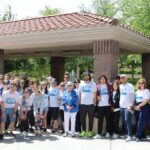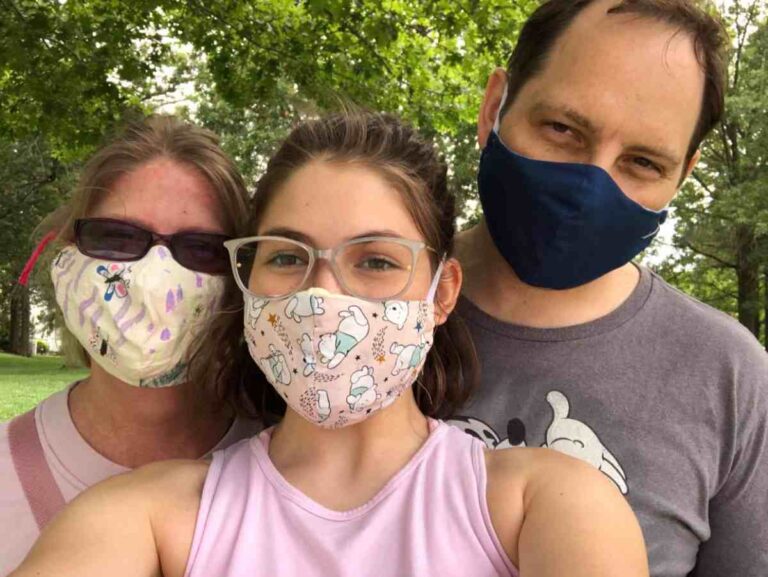Is the United States the land of the “free” or the land of the “me”? Are personal freedom and empathy bound to be in conflict or can they co-exist? I propose that they can, in fact, fuel each other.
When the Coronavirus started circling the globe I remember thinking two things:
- As tragic as this virus is, the precautions healthy people will encounter may result in more widespread understanding for people with chronic illness who have to live their daily lives with restrictions to protect against viruses.
- The chronic illness community will be able to help our healthy counterparts adjust to their temporary new lifestyle because many of us have already been doing this for years because of altered or inadequate immune systems.
Wow, was I wrong.
Always optimistic, I had visions of this beautiful, symbiotic relationship in which we would all work together, singing in unison about peace, love, and togetherness (socially distanced of course) and fighting this invisible virus together. Then, as the months dragged on, people claimed their freedoms were being infringed upon as they were asked to stay at home to protect their grandparents…while other people were dying from a global pandemic. I started to feel less optimistic.
As states reopened from the initial shut-downs and Costco required masks, Costco became emblematic of the fight between the freedom to stay virus-free and the freedom to, um, not cover your face with a piece of cloth? Honestly, I am still having a very hard time understanding. I discuss the incongruence and disparity between those “freedoms” in ‘Anti-Maskers’ Actually Infringe Upon My Freedom on TheMighty.com. The response to that article was mostly supportive; however, I still got a few “what about your personal responsibility?” and “If you are scared stay home!” comments. Which are exactly the kind of unempathetic, and honestly, unrealistic comments that prompted the article.
Any interaction with the outside world is fraught with danger when other people in the world are not careful, because of the insidious and invisible nature of how the virus spreads before symptoms develop. I have actually ventured out a couple of dozen times in the intervening months since I wrote the first article, very carefully, and every time it feels like I am taking my life into my sanitized hands, trusting it to a mask and the 6-10 feet I try to keep between me and other people. Even if I hadn’t left home this isn’t a virus that my “staying home” prevents.
Well, okay, if I, and the 90 million other Americans who are at higher risk of serious illness if infected by COVID, could be 100% isolated from the people who are not being careful, or the people they spread it to, then I guess we could just “stay home.” But no person is an island. It is impossible to stay in complete isolation, indefinitely. We, who are at-risk, need groceries, we need to get medications, we have doctor appointments and other medical needs (some are virtual, but some have to be in-person), and many at-risk people work, go to school, and still have to function “out there” in everyday society. We are not expendable. Being able to “stay home” 100% of the time for months and months is not the norm.
As I illustrated in the Mighty article, we also have family members who have the need and the right to leave home. If this had been taken seriously and we had been able to contain it in three or six months, asking at-risk people and their families to stay home would have been reasonable. It has now been nearly ten months since I started to isolate at home. I am fortunate, my husband has been allowed to work remotely. Our grown son brings our groceries. Our daughter has mostly been able to stay home, but at 14 years old, there are things which she yearns to leave for, she plays a sport, and while it is a solo sport, no matter how careful she is, she is petrified she will not be careful enough and will bring the virus home and kill me. My teen’s mental health is at least as important as the right to not wear a mask because someone “doesn’t wanna” right?
I get it. It’s hard to wear a mask. There are people who just can’t. For example, I have developed heart issues and in an episode of tachycardia I get shortness of breath. I’m also severely claustrophobic. These two, together, make a mask nearly impossible to wear. Shortness of breath inside a mask makes me feel like I’m suffocating and it’s all I can do not to rip it off; but I’m pretty sure a ventilator would be even worse. Since I know that I have difficulty wearing one, I make choices about only going out for necessities, I wear masks that are big enough to give me more room to breathe without the fabric getting sucked into my mouth, and I limit the amount of time I wear a mask without a planned break, so I know I can do so effectively. People who have trouble wearing masks would benefit from the empathy of others, and wholesale mask wearing to make them more safe, though, would they not?
In the months since I wrote the article for The Mighty, the fight about COVID went from anti-masking to in-person dining with a little bit of anti-vaxxing in between (did you get your microchip yet?).
The truth is, the economy is not working for the average American. That is causing stress, and it is gutting main street and, in turn, further gutting empathy. It is making it seem that we can only address the needs of one group or another – hence the “if you are scared stay home” line. So many people have lost their jobs, and countless Americans are in fear of losing their homes. Unfortunately, Americans are being pitted against each other to believe that our interests are not aligned, while the billionaires are getting richer (who ever heard of Centibillionaries?) and lawmakers refuse to do their jobs. I’ll never understand how we lost the message that working together to decrease the pandemic benefits us all, morally, physically, and financially. In July, Wall Street said that masking would save the economy and now economic epidemiologists are studying how to dovetail health and economic considerations together to have the best outcome for both.
As a result of the fighting, the isolation, the economic damage, the misinformation, the loss of life, the fear of the virus, the helplessness, and more, unprecedented numbers of people have experienced mental health crises either caused, or exacerbated, by the pandemic. Please seek help if you need it. I have. I see a counselor every week to help me cope with my illness and we definitely deal with the stress surrounding the pandemic. https://mhanational.org/covid19
As a society, why aren’t we trying to make it as safe as possible for the vulnerable among us rather than excluding them? Empathy, if it had existed in these past months may have dictated that everyone did their best to make the world as safe as possible for all. After all, safety for the vulnerable people of society to move freely would have meant safety for all Americans. It isn’t selfish on the part of the vulnerable to ask for us all to be safe (yes, I’ve been called selfish by anti-maskers when I said that it would be nice if everyone followed safety protocols so it was safer for the vulnerable populations!).
Empathy could have provided an opportunity for our country to realize that healthcare is, in fact, a human right. George Floyd’s graphic, brutally public murder opened the eyes of an entire generation to systemic racism. Those eyes then finally started to see the undeniable fact that black and brown people were also dying at higher rates from COVID. People finally understood that this was due to access and equity issues. We cannot be a good society until we address systemic racism. I don’t know if these truths were unmasked due to the slower pace we all have from being in a pandemic, or the fact that people took to the streets and to the internet to speak out, but it is past time to stop ignoring the disparities. It is time to look at our collective empathy, or lack thereof, and acknowledge we are failing each other. By failing to mask; by failing to ensure a minimum level of healthcare to all people; we are failing each other. Guaranteeing health care for all ensures that we can pursue our other freedoms more fully.
Over 333,000 Americans (1.77mil people worldwide) are dead from this virus, not all of them were vulnerable. The excess deaths for the year are even more extreme. The ‘rona doesn’t care whether you believe in it or not. Besides, empathy would have made this entire year better for all of us. It may have helped us to fight together to get a stimulus bill passed to garner more benefits for the people, to support small businesses and people who are out of work due to the virus (note: due to the virus, not due to governmental regulations) rather than fighting each other over in-person dining, or whether to open up youth sports, or to open up schools, or if people should be required to wear masks to gatherings, or if gatherings should be held at all, or, now, if people should get vaccinated…
Empathy is always the answer. Empathy may just be our only way out of this mess and back to freedom.
Read ‘Anti-Maskers’ Actually Infringe Upon My Freedom on TheMighty.com, where it first appeared.
You can also read it here on the #MyositisLIFE site.





0 Comments